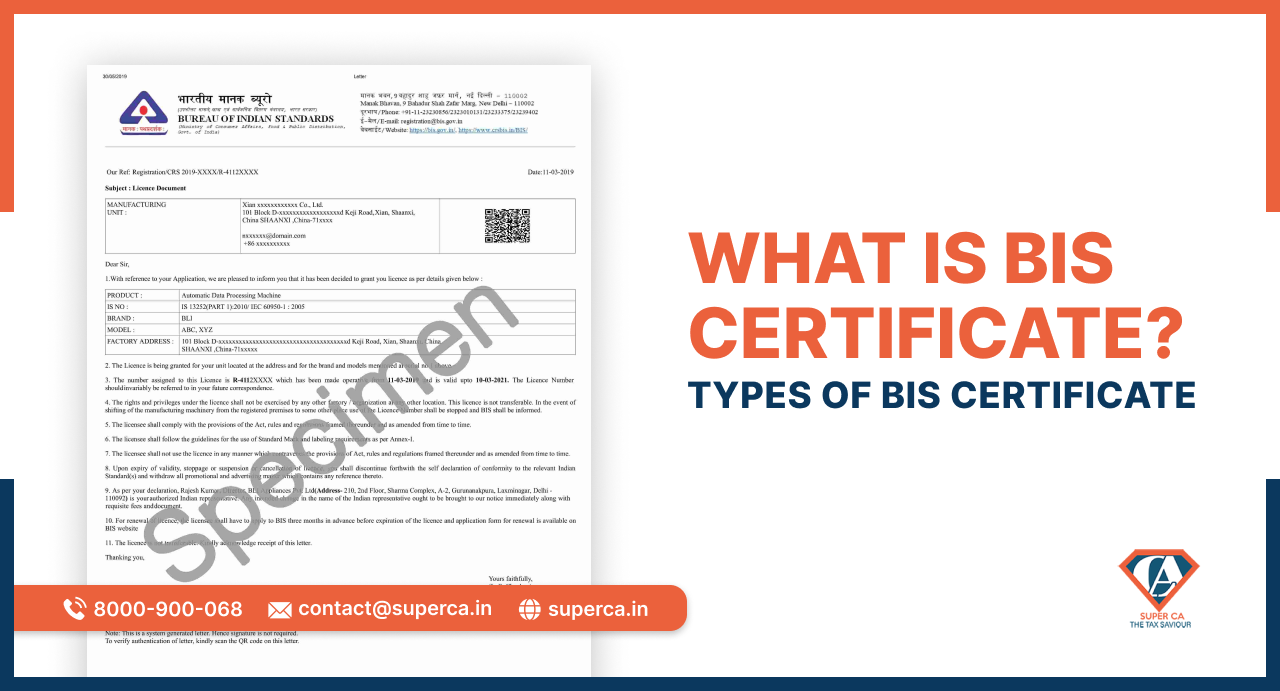A Quick Guide to Get BIS Certificate in India! Types of BIS Certificate


A BIS certificate provides the customer a third party guarantee of the safety, reliability and the quality of the products. BIS certification is generally optional in nature and the company may or may not perform this certification. However, the Government of India has mandated this certificate for some products keeping in mind the health of the public. In this blog, we will go through the process for acquiring BIS certificates for products in India.
The Bureau of Indian Standards is responsible for providing the certification in India. The government established The Bureau of Indian Standards in 1987 through an act of the Parliament. This bureau has been encouraging and nourishing the standards Movement in the country since then. The Bureau of Indian Standards performs various activities such as formulation of standards, product certification, hallmarketing, testing and more.
The product certification scheme of Bureau of Indian standard
One of the world's largest schemes is the BIS product certification scheme. It has over 26500 licensees which cover more than 900 products. Under a BIS certificate, the licensees can use the ISI mark on the products which depicts that the products are of good quality. According to the notification of the government, 90 products need to compulsorily acquire a BIS certificate. Licence has been provided for over 50 Indian standards in 40 different nations.
In India, aBIS certificate is provided for products under various types of schemes by the government. These schemes are listed below:
Normal process for domestic manufacturers: The applicant should submit the BIS certificate application along with the required documents and the specified fee. Once the applicant has submitted the application, A BIS Officer will carry out a preliminary factory evaluation. He will test the samples in the factory and will also draw some samples for independent testing. Applicants will be provided a BIS certificate if the sample is acceptable. In this scheme, the applicant will receive a BIS certificate within 4 months of submitting the application.
Simplified process for domestic manufacturers: In this process, the applicant will have to submit a test report of the samples from a lab that is approved by BIS in addition to the application for BIS certificate. If the test report is acceptable, then a BIS officer will carry out the verification of the premises of the factory. If the BIS officer is satisfied with the verification then, a BIS certificate will be provided to the applicant. In this method, the applicant may receive the BIS certificate within 30 days of submitting the application along with the required documents and test report.
Tatkal scheme: The manufacturers who have to obtain the standard mark of BIS compulsorily under the notification of the government, may obtain the BIS licence under the Tatkal scheme. Under this scheme, the application for a BIS certificate is processed within strict timelines and the total time for the processing of the application for the BIS certificate is around 30 days. Also, an application, if received under the Tatkal scheme, will be considered as a priority and will be processed fastly.
ECO mark scheme: Eco-friendly products are granted a BIS certificate under the ECO mark scheme. In order to qualify for the Eco mark the product must comply with the additional requirements which are mentioned in the Indian Standard. The process of getting a BIS certificate under this scheme is similar to that of a domestic manufacturer scheme.
Foreign manufacturer certification scheme: Under this scheme, the BIS certificate is granted to Overseas applicants or foreign manufacturers within a period of 6 months.
The government has mandated the obtaining of a BIS certificate for certain products in order to ensure public health and safety. Such products cannot be manufactured or sold without having a BIS certificate. Some of such products are listed below:
In this blog, we learnt about the Bureau of Indian Standards a.k.a. the BIS and its product certification scheme. We also discussed the various types of BIS certificate schemes like the normal and simplified procedure for domestic manufacturers, the tatkal scheme, the ECO mark scheme and the foreign manufacturer certification scheme. We also discussed the products which necessarily need the BIS certificate.

|
Essential LLP Registration Documents: A Complete Checklist for Entrepreneurs Author: Rahul Singh 04 Apr, 2024
|
Get inspired by these stories.